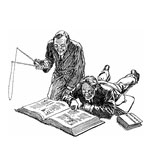Economics Is Not Chemistry

The Handbook of Economic Sociology, 2nd ed
By Neil J. Smelser and Richard Swedberg
Publisher: Princeton University Press
Pages: 736 pages
Price: $39.95
Review Author: Thomas Storck
Although the foundations of Catholic social teaching lie much deeper than concerns about economic justice, economic questions do loom large in any consideration of the Church’s social doctrine. Unfortunately, many Catholics are predisposed to a negative view of Catholic social teaching because the discipline of economics, as it has largely developed since the late-18th century, has constructed a worldview that believes that human behavior operates according to quasi-mechanical laws. These “laws” find their purest expression in a free-market economy. Thus, any attempt to challenge these laws — even by one’s Church — is met with hostility.
But free-market economists have not been content solely to defend their hegemonic worldview. Rather, they have sought to morph their discipline into an architectonic “science” of human behavior, and at least since the 1960s have tried to explain such diverse behaviors as marriage and divorce or childbearing with the tools and techniques borrowed from their analysis of man’s buying and selling. In so doing, economists have consciously tried to escape from the category of the social sciences and emulate, as much as they can, the natural sciences. They have tried to present economics as a science that is able to predict human behavior, not simply describe it. To be counted with physics and chemistry — and not with sociology — has been their goal.
But there are those, including some of the most well-known writers of the 20th century, such as Max Weber, Richard Tawney, Karl Polanyi, and Christopher Dawson, who see economic activity as a part of man’s life. While most economists view economic conduct as a separate department of human behavior with its own laws or, even worse, see all of human life as simply an extension of economic behavior, these sociologists and historians have looked upon economics as a descriptive discipline, more akin to sociology or history than physics, and understand economic activity as embedded in man’s social life. Their vision is known as economic sociology. The present volume, consisting of 30 chapters presenting various aspects of economic sociology, is an up-to-date synthesis of this field.
Economic sociologists apply “the frames of reference, variables, and explanatory models of sociology to that complex of activities which is concerned with the production, distribution, exchange, and consumption of scarce goods and services.” According to “mainstream economics, actions are constrained by tastes and by the scarcity of resources, including technology. Once these are known, it is in principle possible to predict the actor’s behavior, since he…will always try to maximize utility or profit. The active influence of other persons and groups, as well as the influence of institutional structures, is set to one side.” So while “the analytic starting point of economics is the individual; the analytic starting points of economic sociology are typically groups, institutions, and society.” Thus, contrary to free-market theory, economic sociologists argue that individuals rarely act alone to maximize their personal utility. Rather, we all act according to certain group norms, some of us more than others. As one of the authors in this volume puts it, “Whether you are running a farm in Croatia or in Sicily matters quite a bit for how you will behave. We cannot predict much about how you will run a railroad in Cleveland without knowing whether the year is 1880 or 1980.” More pointedly, another author, discussing economic change in post-communist Europe, notes, “Devising new formal rules to institute market economies in Eastern Europe and the former Soviet Union has had only limited success; this has pointed to the intractable nature of social arrangements embedded in interpersonal ties, cultural beliefs, norms, and old regime institutional arrangements studied by economic sociologists.”
Economic behavior is always conditioned by society’s laws, as well as by cultural preferences and traditions. There is no such thing as purely “natural” economic behavior. This is not to say that such economic dispositions as the desire to maximize gain or the tendency toward price equilibrium between buyer and seller do not exist. But such dispositions exist within the framework of laws, customs, institutions, and other factors that shape how economic motives and tendencies express themselves.
I commend the editors at Princeton University Press for one particular thing. In the two essays that discuss the economies of the ancient world, the authors use the abbreviations B.C. and A.D., instead of B.C.E. and C.E. To find the traditional usage in a secular academic text is so unusual today that it calls for congratulations. Apparently, political correctness has not yet won a total victory!
In sum, this volume demonstrates that defenders of the Church’s social doctrine need not run for cover whenever economists tell us that human society functions more or less like a machine. Rather, both human freedom and institutional complexity allow ample room for adjusting economic regimes to harmonize with the Gospel. The sooner Catholics understand that the worldview of most free-market economists is incomplete, the sooner we can rededicate ourselves to the Church’s social apostolate without any lingering fears that we are attempting something unnatural and inherently impossible.
You May Also Enjoy
No matter what the Dow-Jones average is doing, “opportunities for work” must be “provided for those who are willing and able to work,” as Pius said.
In both Habits of the Heart and The Good Society, my co-authors and I have…
A recent book has shown that women’s attitudes toward abortion are highly correlated with their…

